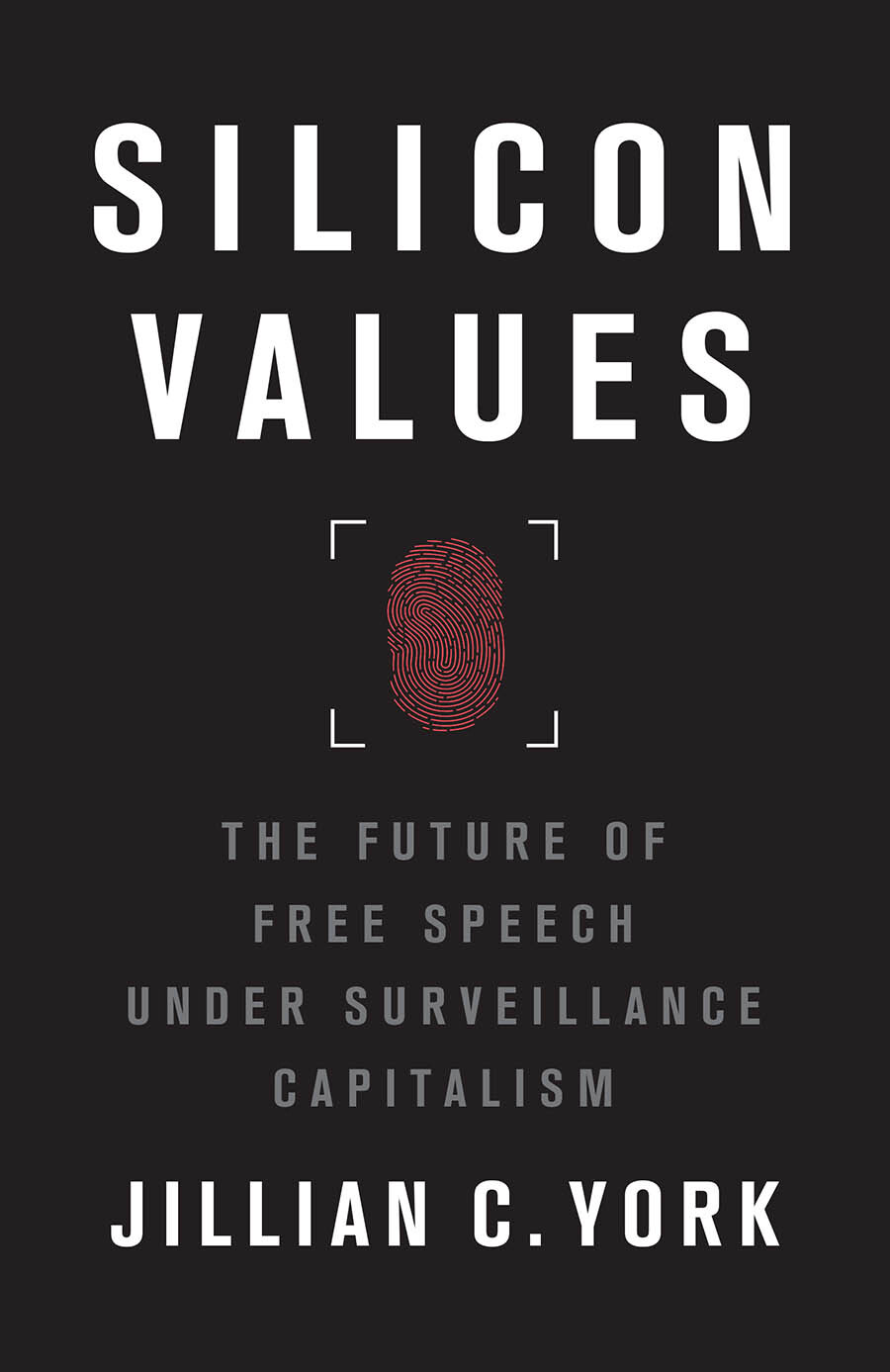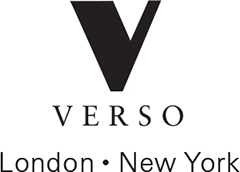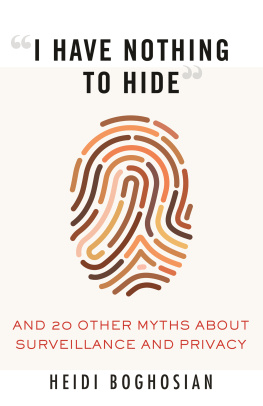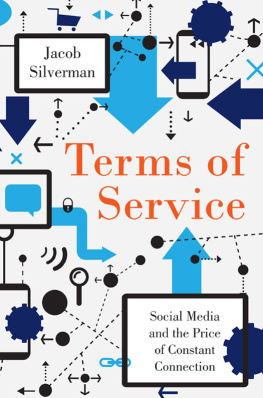Contents

Silicon Values
Silicon Values
The Future of Free
Speech under
Surveillance Capitalism
Jillian C. York

First published by Verso 2021
Jillian C. York 2020
All rights reserved
The moral rights of the author have been asserted
1 3 5 7 9 10 8 6 4 2
Verso
UK: 6 Meard Street, London W1F 0EG
US: 20 Jay Street, Suite 1010, Brooklyn, NY 11201
versobooks.com
Verso is the imprint of New Left Books
ISBN-13:978-1-78873-880-4
ISBN-13:978-1-78873-883-5(UKEBK)
ISBN-13:978-1-78873-882-8(USEBK)
British Library Cataloguing in Publication Data
A catalogue record for this book is available from the British Library
Library of Congress Cataloging-in-Publication Data
A catalog record for this book is available from the Library of Congress
Library of Congress Control Number: 2020948737
Typeset in Fournier by MJ&N Gavan, Truro, Cornwall
Printed and bound by CPI Group (UK) Ltd, Croydon CR0 4YY
For my father, Terry C. York (19522011)
and for Lina Ben Mhenni (19832020)
Contents
Silicon Valley, as well as the broader Bay Area, offers a landscape of contradictions. Its a place where the uber-wealthy, dressed like university freshmen in jeans and hoodies, saunter past homeless encampments on their way to their enclosed campus offices. Its a place where twenty something engineers shell out upward of three thousand dollars a month to rent tiny, dilapidated rooms in San Franciscos most desirable neighborhoods, only to be bused out of the city each day to go to work an hour away.
It is a place where, according to its critics, disruption is an inevitable force and not one based on [individual] choices, and where people see technical progress as something distinct from, or not in need of, ethical considerations and consequence.
It is a place where traditional or unspoken rules and structures go unacknowledged, where individual freedom is prized over collective action, where the idea of changing the world is centered in a narrow frame of what makes up a society, and where an ethos of moving fast and breaking thingsremoving deliberation and nuance from the iterative processreigns supreme. And it is a place where the conceptualization of freedom is a libertarian one, and as such, executives see no conflict between aiming to disrupt governmental functions abroad or support an opposition movement while unabashedly collaborating with illiberal governments.
However, they warned, by championing this seemingly admirable ideal, these techno-boosters are at the same time reproducing some of the most atavistic features of American society, especially those derived from the bitter legacy of slavery. Their utopian vision of California depends upon a wilful blindness towards the othermuch less positivefeatures of life on the West Coast: racism, poverty and environmental degradation.
Unlike Barbrook and Cameron, many outsiders have depicted Silicon Valley as a center of innovation and success, but the view from inside the Bay Area easily leads one to a different conclusion.
In 2011, in the midst of a period of uprising and upheaval both in the Middle East and the United States, I was hired to work at the Electronic Frontier Foundationone of the oldest and most respected digital rights organizations in the world. In April of that year, my father (may he rest in power) and I rented a U-Haul and embarked on a cross-country road trip, arriving in San Francisco on May 1, International Workers Day, an auspicious day to start a new job that comes with great purpose.
Upon arriving at my tiny apartment in the citys central Mission district, I was immediately struck by the contradictions. This was a city renowned for being the heart of innovation and success and yet, on my first Saturday morning there, as I strolled down Twenty-First Street to buy a coffee at the legendary coffeehouse Philz, I watched as a man squatted and defecated right on the sidewalk. Later, I would learn about the citys failure to provide meaningful help to its seemingly Unsurprisingly, they never materialized.
I moved to Berlin just three years later, a decision based largely on the fact that, by then, my job was taking me to Europe and the Middle East on too regular a basis for me to stomach the constant twelve-hour flights. On trips back to the Bay, I have dodged piles of used needles, watched helplessly as historic bars and hangouts (like the Missions last lesbian bar, the Lex) closed down, and witnessed as an ever-increasing amount of anti-tech sentiment was spray-painted and chalked on sidewalks and streets.
But this book is not about how San Francisco has changed, nor is it about the broader problems with Silicon Valley per se. Those stories have been written, and will continue to be written as time marches on, by people with far more connection toand stake inthe Bay Area and its future. So allow me to take a step back.
As the world burns
As I write this on a calm morning in late May, safely isolated in my Berlin apartment, Im watching rapt as the Bay Areaas well as Minneapolis, Brooklyn, and much of the United Statesgoes up in flames. I regularly read the WashingtonPost and still subscribe to the print edition of the New Yorker , but most of my news comes from people, people I may or may not have ever met in real life but who have been part of my network for more than a decade. This news, sometimes in the form of links to published articles, and sometimes direct from the streets, is shared on Twitter, Facebook, Instagram, Reddit. At thirty-eight years oldand like much of the worlds internet users todayI am entirely reliant on media that is shared on corporate platforms.
How did this happen? That, dear reader, is precisely the question I hope to answer with this volume. But first, I would like to acknowledge a few things, namely what this book is, what it isnt, and why Im writing it.
This book seeks to encapsulate the history of how Silicon Valleys major communications platforms created a system apartspecifically, a system that governs how we can express ourselves online. As the title of this book alludes, this system of governance is encapsulated within a broader system, that of surveillance capitalism, a term popularized by scholar Shoshanna Zuboff with her book The Age of Surveillance Capitalism essential reading for those seeking greater understanding of how we got here. This volume is not, however, about surveillance capitalism per se; rather, I see it as the system that has enabled a milieu in which companies, not governments, get to decide how we may express ourselves.
The stories in this volume are at times personal, at times observed from afar, but come together to tell a story of how, over the past decade, Silicon Valleys mega-corporations have come to align with governmental power while people in countries around the world, though increasingly divided politically, have come to distrust both corporations and government.
My experiences over the past decade have largely taken place outside of the United States, and so too do most of the stories contained within. Readers wishing to gain a deeper understanding of the impact social media has had on democracy in the United States are encouraged to read the work of scholars including Siva Vaidyanathan, Joan Donovan, Nathaniel Persily, and Ethan Zuckerman, among others.
Although the battles over copyright that have been fought over the past decades most certainly have played a role in the development of platform governance, copyright law is a complex and divisive topic, and one that is simply outside of my expertise. Nevertheless, understanding the basic history of intellectual property regulation and moderation online is important for any understanding of content moderation, and a pursuit I would encourage of any scholar on the subject.







